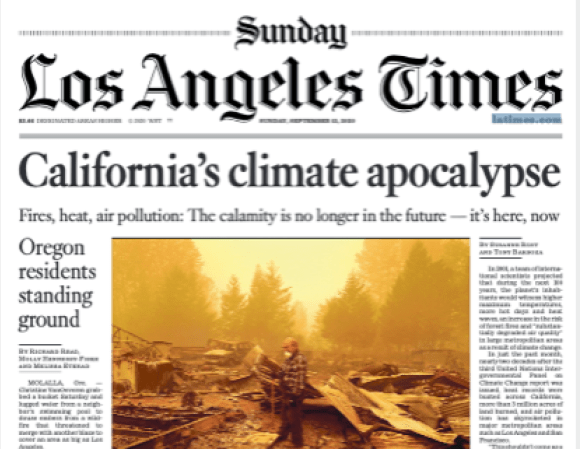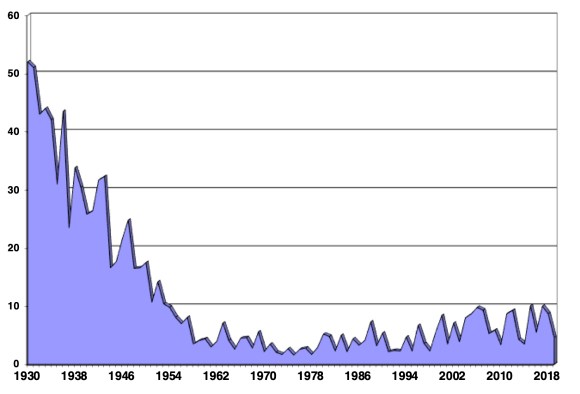Churchill once defined a fanatic as “someone who can’t change his mind and won’t change the subject,” so it was entirely predictable that the climatistas would declare the massive wildfires raging in the west right now are proof that the climate change debate is over. Shut up, they explained. Governor Gruesome Newsom says so, so there! Also the Los Angeles Times today:

The real reason for the large fires is the overloading of our western forests over the last several decades, which can be laid at the feet of excessive and misguided fire suppression starting almost a century ago, and environmentalist opposition to any pro-active forest management on public lands. Environmentalists without fail run to the courthouse to block every Forest Service forest thinning plans, delaying and sometime blocking sensible forest management.
This morning I updated my old time-series of total acres burned in the U.S. since 1930 that I used to include in my annual Index of Leading Environmental Indicators, and you can see that the U.S. used to experience as much as 50 million acres burned in some years. That number fell to as low as 2 million from the 1950s through the 1970s, when it became more evident that this was a mistake.

Millions of Acres Burned in Wildfires, 1930-2019
The interesting thing with the current climatista fanaticism is that the best refutation of it comes from ProPublica, a distinctively left-wing media outlet. The entire article is worth a read if you have time, but here are the important numbers from the article:
Yes, there’s been talk across the U.S. Forest Service and California state agencies about doing more prescribed burns and managed burns. The point of that “good fire” would be to create a black-and-green checkerboard across the state. The black burned parcels would then provide a series of dampers and dead ends to keep the fire intensity lower when flames spark in hot, dry conditions, as they did this past week. But we’ve had far too little “good fire,” as the Cassandras call it. Too little purposeful, healthy fire. Too few acres intentionally burned or corralled by certified “burn bosses” (yes, that’s the official term in the California Resources Code) to keep communities safe in weeks like this.
Academics believe that between 4.4 million and 11.8 million acres burned each year in prehistoric California. Between 1982 and 1998, California’s agency land managers burned, on average, about 30,000 acres a year. Between 1999 and 2017, that number dropped to an annual 13,000 acres. The state passed a few new laws in 2018 designed to facilitate more intentional burning. But few are optimistic this, alone, will lead to significant change. We live with a deathly backlog. In February 2020, Nature Sustainability published this terrifying conclusion: California would need to burn 20 million acres — an area about the size of Maine — to restabilize in terms of fire. . .
Carl Skinner, another Cassandra, who started firefighting in Lassen County in 1968 and who retired in 2014 after 42 years managing and researching fire for the U.S. Forest Service, sounded profoundly, existentially tired. “We’ve been talking about how this is where we were headed for decades.”
Nice work by ProPublica, which otherwise inhabits a zone to the left of NPR.
Meanwhile, worth also a brief look at a 2012 paper in the Proceedings of the National Academy of Sciences entitled “Long-Term Perspectives on Wildfires in the Western USA.” Here’s the relevant part of the abstract (with my bolded highlight):
Analysis of climate reconstructions beginning from 500 CE and population data show that temperature and drought predict changes in biomass burning up to the late 1800s CE. Since the late 1800s , human activities and the ecological effects of recent high fire activity caused a large, abrupt decline in burning similar to the LIA fire decline. Consequently, there is now a forest “fire deficit” in the western United States attributable to the combined effects of human activities, ecological, and climate changes. Large fires in the late 20th and 21st century fires have begun to address the fire deficit, but it is continuing to grow.
Translation: we can expect a lot more large fires until we get the overgrowth of our forests under control. Forest management isn’t rocket science; native Americans actually practiced it. Active forest management is especially necessary if serious climate change is real, but instead of forest management, the climatistas think we can stop destructive forest fires by banning fracking and the internal combustion engine.
See also Michael Shellenberger on the California fires.




